Research on the Top AI Companies in the United Kingdom

AI emerges as a beacon of innovation and economic promise within the UK landscape. The Startups 100 Index reveals a striking 66% increase in average funding for UK-based AI startups between 2021 and 2023, signaling an overwhelming belief in the market potential and innovative capabilities these companies possess. With projections of £3.4 billion in funding by year-end, our research aims to uncover the catalysts driving this growth and assess whether the UK can not only meet but also exceed its ambitious targets in the AI domain.
However, success in the AI sector is not merely measured by financial metrics alone. Our comprehensive analysis evaluates companies against external validation, market opportunity, idea innovativeness, and strength of concept. By focusing on these elements, we aim to provide a nuanced understanding of the leaders in the UK AI space, highlighting those that are not just surviving in a competitive environment but are thriving as pioneers of the future.
Disclaimer:
NO FINANCIAL ADVICE—The following research serves as an independent analysis of various businesses that are at the forefront of innovation, particularly in the realm of artificial intelligence (AI). It is crucial to emphasize that this document is not intended as investment advice. Rather, it aims to provide an insightful overview of how these enterprises leverage AI technology to reshape industries, enhance efficiency, and create value.
Pet Care
Scooch
Scooch is revolutionizing pet healthcare with an AI-driven subscription service that prioritizes preventative care and offers seamless, personalized solutions for pet parents.

The AI Growth Fund by EHE Ventures has made a notable investment, contributing a substantial six-figure amount to Scooch, a London-based startup transforming pet healthcare through artificial intelligence. Scooch operates as an all-in-one subscription service that leverages an AI co-pilot to construct a data-driven health marketplace tailored for pets. This innovative approach earned Scooch the 55th spot on the 2024 Startups 100 Index, a recognition that highlighted its groundbreaking use of technology to address the evolving needs of pet care.
Founded in 2021 by Baris Ozaydinli, Misha Tsvik, Rafa Gaino, and Mia Lewin, Scooch started with a simple goal: to bridge a gap in pet healthcare. When Baris's puppy faced health issues during lockdown, it sparked an insight. Combining his expertise in human wellness tech with the growing demand for sustainable pet care, Scooch was born.
What Sets Scooch Apart
Currently, the UK's only AI-powered pet healthcare subscription service, Scooch, offers:
- Comprehensive health assessments to identify potential issues.
- 24/7 virtual vet support for immediate guidance.
- Customized treatment plans tailored to the pet's unique needs.
AI plays a vital role in analyzing health data and delivering actionable insights, empowering pet parents to proactively monitor and improve their furry friends' well-being.
Value and Growth
Because pets can't communicate their needs directly, Scooch utilizes AI to fill that gap, helping owners detect issues before they worsen. These insights not only promote healthy habits but also significantly reduce reliance on emergency vet visits, saving both stress and money for pet owners.
Scooch's innovation in combining technology with pet healthcare has made it a leader in the growing pet tech industry. By serving a pet-loving market with advanced technologies, Scooch ensures that pets live healthier, happier lives while making preventive care accessible and affordable.
The results speak for themselves. Scooch has achieved a 10x revenue growth over the last 12 months, secured a £1 million pre-seed funding round, and earned a Trustpilot score of 4.8/5.
Legal
Robin AI
Robin AI is revolutionizing the legal world through cutting-edge technology that automates contract reviews, dramatically reducing costs and streamlining legal workflows for businesses.
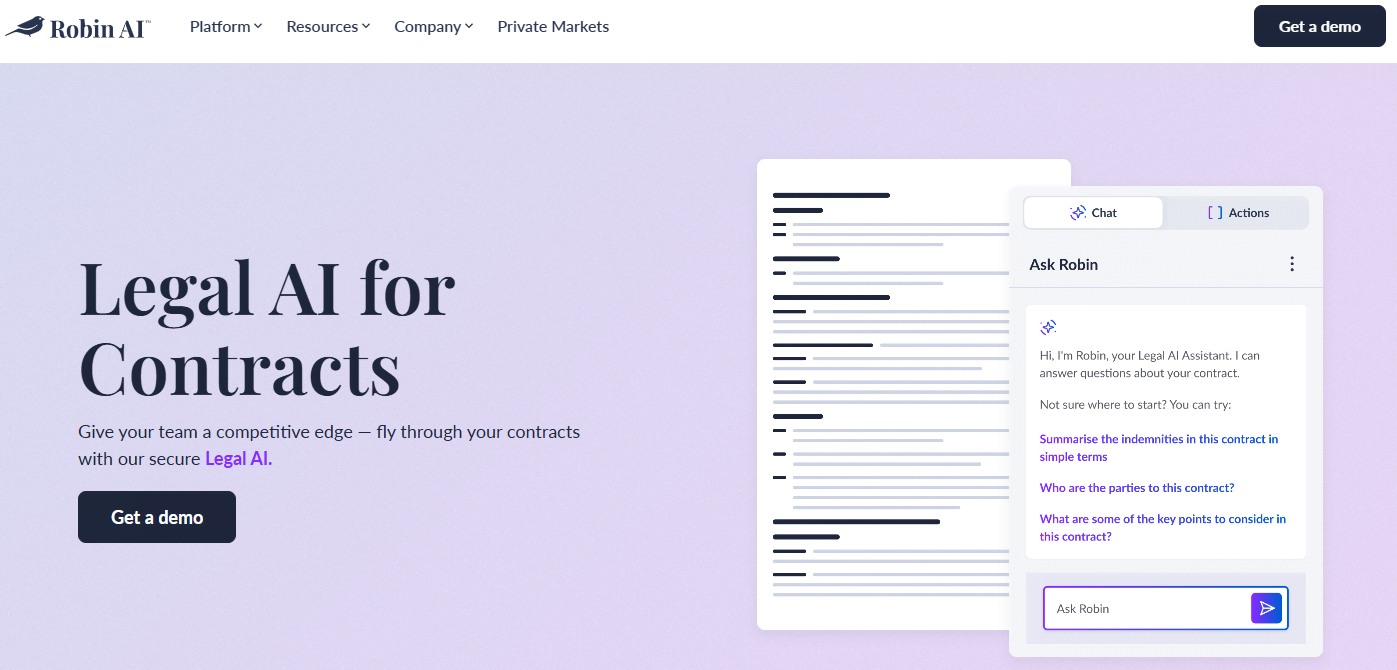
Established in 2019 by Richard Robinson, a former City of London lawyer, and Dr. James Clough, a tech innovator, Robin AI was born from frustration with the inefficiency of traditional legal processes. Robinson recalls countless hours spent on repetitive administrative tasks, which, in his view, were ripe for automation. Conversations with Clough highlighted the potential of AI to address these inefficiencies, setting the foundation for their groundbreaking venture.
The startup's mission is clear and bold: "Harness the power of AI to transform legal services, reducing inefficiency and making law more accessible to businesses and individuals." Robin AI focuses on fast, accurate contract reviews—traditionally one of the most time-intensive legal tasks. Instead of relying on pre-existing models, Clough designed a proprietary large language model (LLM) tailored exclusively for the legal sector. Trained on over two million private legal contracts, this advanced tool identifies and analyzes critical elements such as liability clauses and payment terms with remarkable accuracy, enabling swift commercial applications.
What Sets Robin AI Apart
The credibility of Robin AI lies in its performance. During a demonstration for top London investment firms, the platform's AI-powered assistant reduced contract review times by an impressive 85%. These results have not only earned the trust of law firms but also opened doors to partnerships with in-house legal teams. By replacing billable hours with a software subscription model, Robin AI is set to disrupt traditional legal billing structures and democratize access to quality legal services.
Robin AI's rivals may crowd the market, but its tailored solutions stand out. Beyond contract reviews, its LLM software helps organizations efficiently track and retrieve contract-related information from their repositories, addressing yet another common pain point for legal teams.
Value and Growth
Robin AI's recent funding successes highlight its growing momentum in the field. Following a $10.5 million Series A round, the startup secured an additional $26 million in 2024. This funding has fueled its global ambitions, including the establishment of a new office in Singapore last July, setting the stage for expansion across Asia.
Genie AI
Genie AI is transforming the legal industry by making legal knowledge and services more accessible and affordable for startups with limited resources.
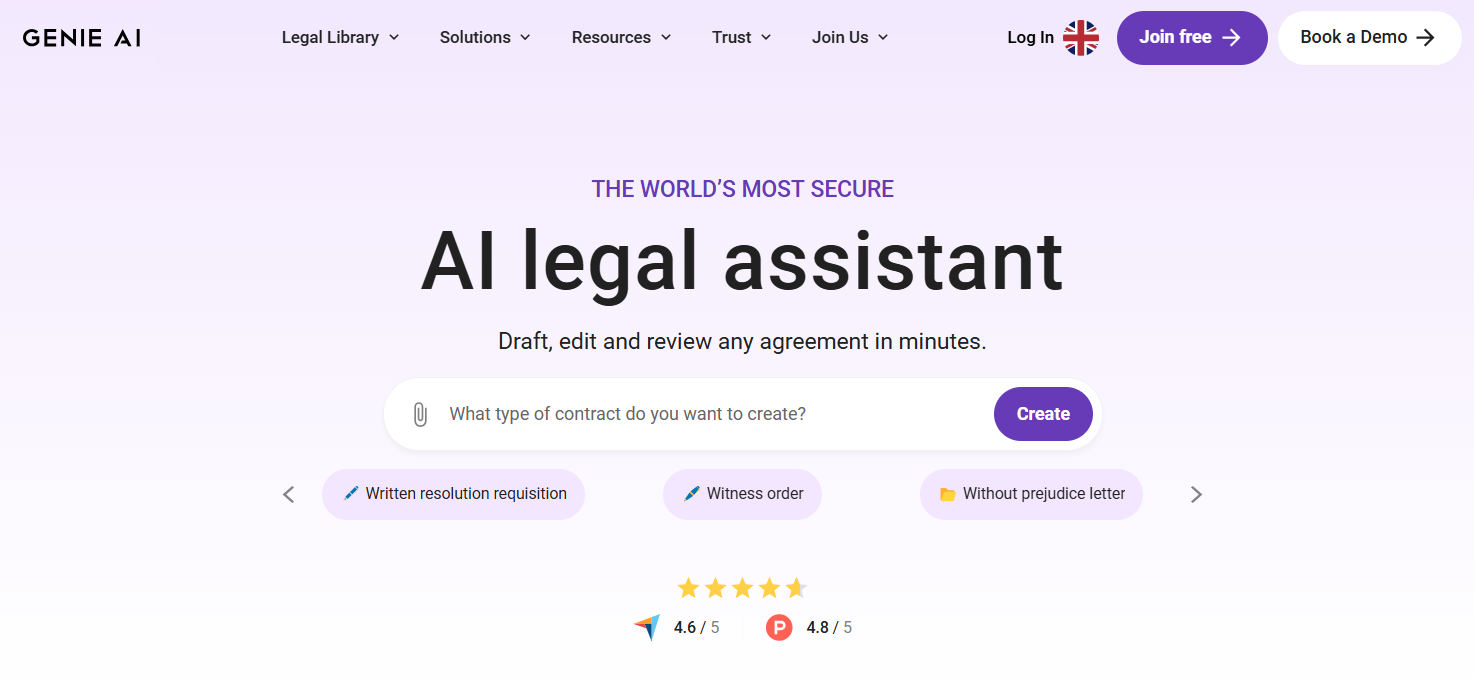
Historically, the legal field has been viewed as opaque, complex, and costly. Genie AI, a London-based startup, is changing that perception. By offering open-source access to hundreds of customizable legal business templates, Genie simplifies legal processes for everyone.
Leveraging advanced machine learning, Genie enables users to analyze contract clauses against thousands of prior agreements. Each clause is accompanied by plain-language explanations of its implications, along with alternative solutions and actionable guidance. This ensures a thorough understanding of legal content without the need for specialized expertise.
But these templates aren't simple "copy-paste" solutions. Unlike traditional law firms that often charge exorbitant fees to draft standard contracts repeatedly, Genie's technology tailors documents to fit specific contexts such as industry, business size, jurisdiction, and contract type.
What Sets Genie AI Apart
Furthermore, Genie AI shifts the traditional law firm billing model. It removes the administrative hassle of tracking billable hours, offering a convenient SaaS subscription platform with instant access instead. This innovation is more than a workflow improvement; it signals a redefinition of legal accessibility.
Value and Growth
Genie AI is not just another startup. Supported by investors who have backed OpenAI as well as academics from UCL, Oxford, and Imperial College, Genie AI has positioned itself at the forefront of legal tech innovation. Its mission extends beyond improving legal workflows—Genie has ambitious plans to standardize contract drafting worldwide and make legal tools universally free and open-source.
Fitness
MAGIC AI
MAGIC AI is the AI-powered fitness mirror that brings expertise to your bedroom, blending cutting-edge technology with sleek design.

Co-founder Varun Bhanot's foray into fitness began at 20, driven by advice to overhaul his health or face potential problems down the road. After reluctantly hiring a personal trainer (PT), he quickly questioned why the traditional PT model hadn't evolved beyond clipboards and outdated methods, despite the hefty price tag.
Determined to modernize the experience, Bhanot envisioned a solution that would bring cutting-edge fitness coaching into the home. Drawing inspiration from folklore, he conceptualized MAGIC, an AI-driven mirror designed to help users train confidently and privately in their own space.
Note: to fund his vision, Bhanot imported and sold 200 treadmills, generating £50,000 in profit, which he used to develop the first iteration of MAGIC. Recognizing the need for technical expertise, he partnered with co-founder and AI specialist Sunil Jindal, who enhanced the mirror's capabilities.
What Sets MAGIC AI Apart
The heart of MAGIC lies in its proprietary ReflectAI software, an innovative AI platform that provides real-time feedback on performance. Equipped with a discreet camera, the mirror tracks users as they train, correcting form and offering personalized coaching. Behind the glass, sophisticated algorithms and deep learning technology work seamlessly, while the sleek design ensures it blends effortlessly into any home.
MAGIC's intuitive design and groundbreaking AI have earned widespread recognition, landing a spot on TIME's list of the World's Best Inventions. Its innovation lies in its ability to offer high-level coaching without compromising on design or privacy, elevating the standards of home fitness.
Value and Growth
Since debuting as #29 on the Startups 100 Index last year, MAGIC has raised an additional $5 million in venture capital. Its retail presence has expanded significantly, with availability in Decathlon and sellouts in two of London's most prominent department stores. With the fitness market booming, MAGIC meets the growing demand for accessible and innovative training solutions.
Constantly in the spotlight, MAGIC stands among Fast Company's World's Most Innovative Companies for 2024, and its list of accolades continues to grow. It has also attracted angel investors, including renowned athlete Jesse Lingard, further cementing its industry credibility.
Automotive
Wayve
The self-driving vehicle startup, Wayve, has garnered significant attention this week after closing Europe's largest AI funding deal to date.
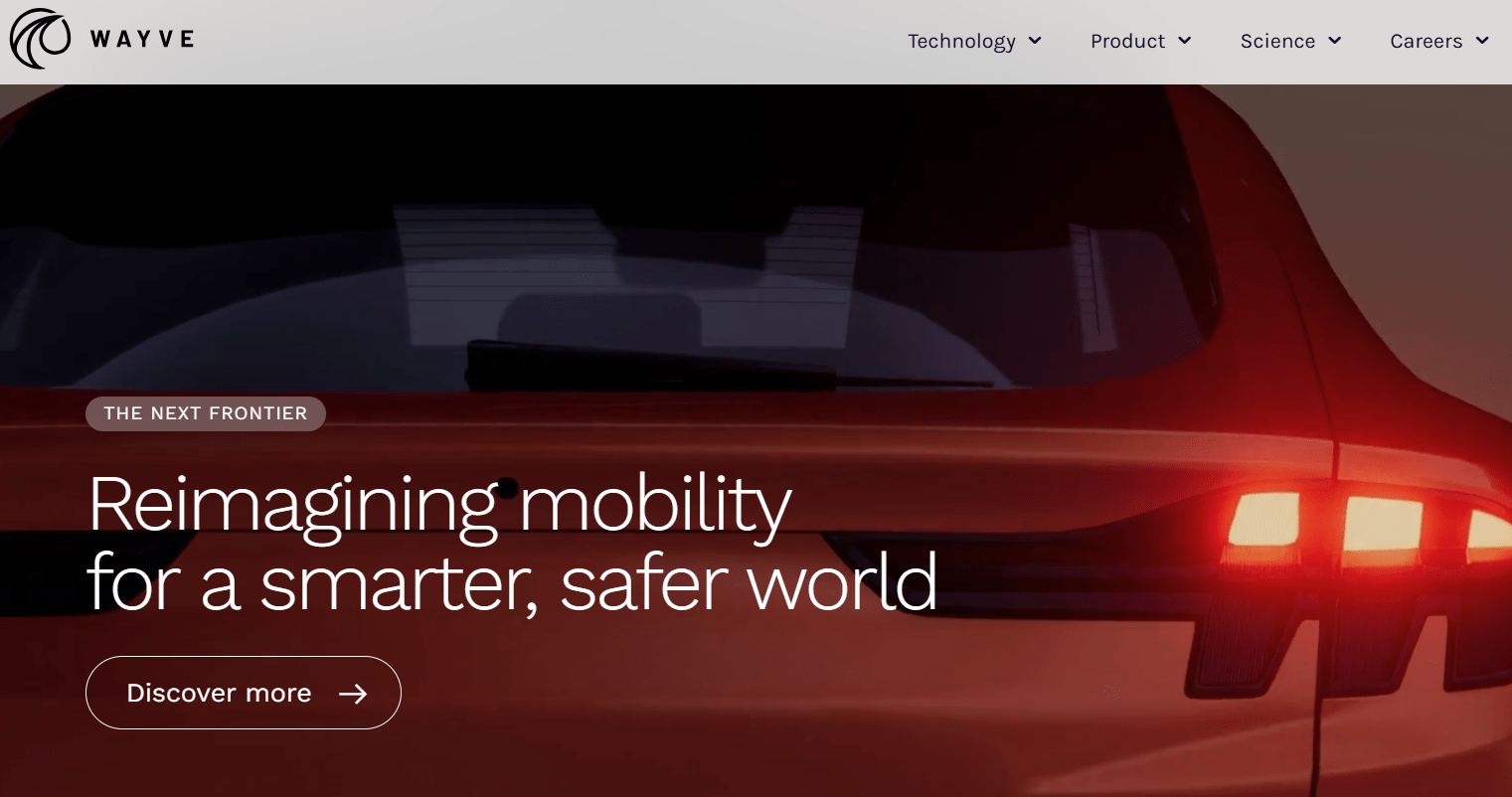
Wayve was co-founded by Alex Kendall, a New Zealand native with an extraordinary academic background. Kendall was admitted directly into the second year of The University of Auckland's mechatronics engineering program straight out of high school. He later pursued a PhD at the University of Cambridge, specializing in Deep Learning, Computer Vision, and Robotics. Drawing from his research, Kendall co-founded Wayve during his final year of study.
His co-founder, Amar Shah, also played a pivotal role in the company's early development, serving as joint CEO for the first three years. Shah, a PhD holder in machine learning, met Kendall at Cambridge, where they conceptualized the startup. Their collaboration saw Wayve achieve remarkable milestones, including securing $20 million in Series A funding with backing from influential figures like Zoubin Ghahramani, Uber's former chief scientist. Shah has since moved on, founding CHARM Therapeutics in 2020.
What Sets Wayve Apart
Wayve's technology is built on "end-to-end learning," which allows its AI to learn how to drive by observing human drivers and learning through trial and error, much like taking driving lessons. This approach enables the system to adapt effectively to real-world driving scenarios.
Unlike Tesla, whose cutting-edge autopilot system requires customers to purchase its vehicles, Wayve aims to provide its AI as a platform that other automakers can integrate into their cars. This innovative business model could bring Wayve's technology to a broader audience.
Note: the timing of Wayve's funding is particularly noteworthy, as it coincides with the UK's pending Automated Vehicle Bill. This legislation will outline the safety standards self-driving vehicles must meet to operate legally on UK roads. With government backing and upcoming regulations, the country aims to unlock a self-driving market estimated to be worth £42 billion. Startups like Wayve are poised to play a significant role in driving this transformation.
Value and Growth
Wayve made a splash in the tech industry in early 2024, following an extraordinary £822m funding round led by backers like Nvidia, Softbank Group, M12, and Eclipse Ventures. This massive investment brought their valuation to £1.40b pre-money and £2.22b post-money, instantly positioning the company as a leading player in the fields of artificial intelligence and autonomous vehicles.
ToffeeX
ToffeeX is transforming the design phase of 3D printing by enabling the creation of highly efficient and complex components tailored for industries such as automotive and aerospace.
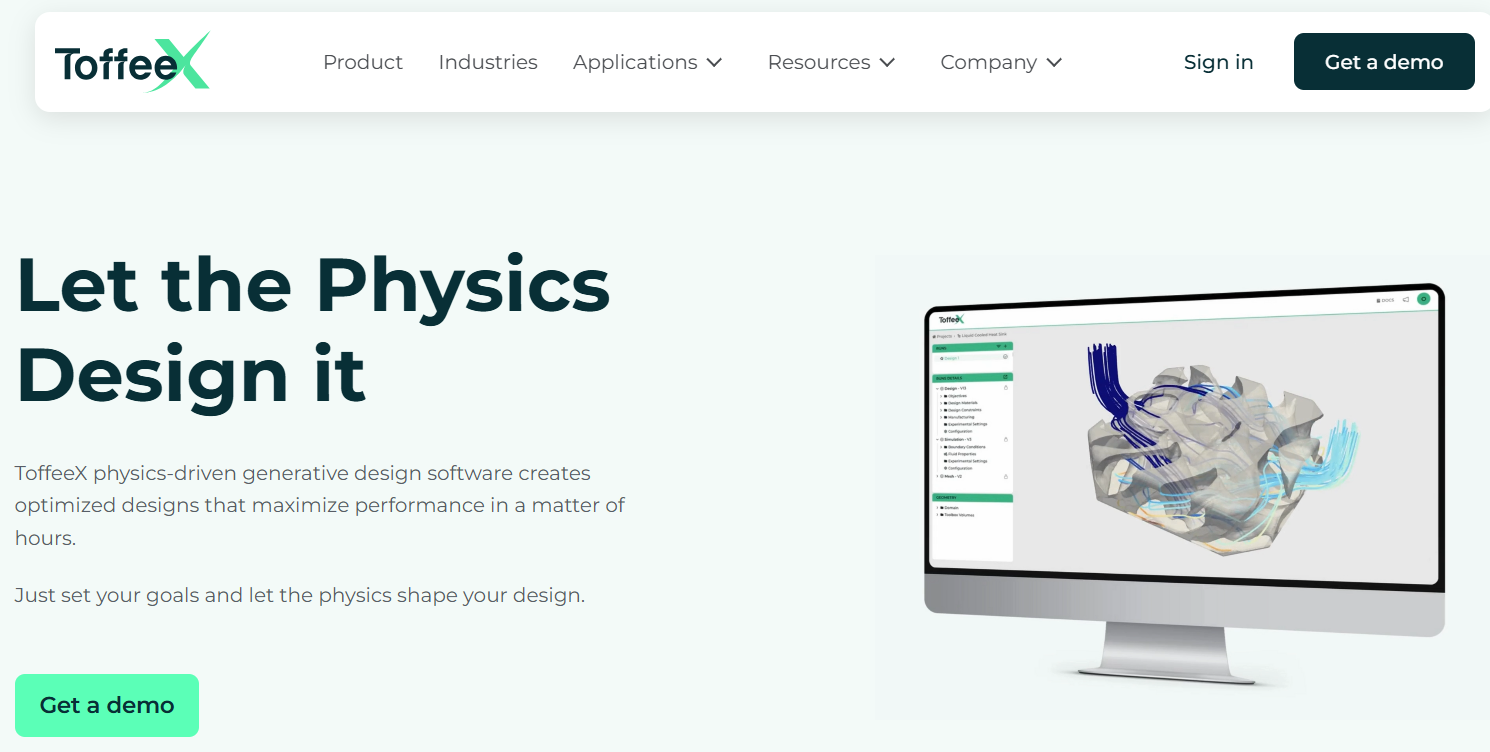
Founded in 2019 by Marco Pietropaoli, Francesco Montomoli, and Audrey Gaymann, ToffeeX (formerly known as ToffeeAM, prior to its rebranding earlier this year) specializes in generative design software ideal for Additive Manufacturing (AM). While AM, commonly referred to as 3D printing, has revolutionized production by enabling intricate designs to materialize in minutes, the design process itself has remained a bottleneck—until now.
What Sets ToffeeX Apart
ToffeeX is pushing boundaries with its capacity to generate intelligent thermo-fluid components. These parts, such as pumps and valves, are critical to heating systems and car engines and have traditionally posed a significant challenge in terms of efficiency and cost-effectiveness. By incorporating advanced fluid topology optimization into its software, ToffeeX identifies ideal regions for fluid flow to maximize energy transfer. This means manufacturers can now produce parts that are not only top-tier in performance but also scalable for mass production.
The results speak for themselves. Components designed through ToffeeX are reported to be up to 40% more efficient and can be manufactured 20 times faster compared to conventional methods. While its applications shine in Additive Manufacturing, the process is equally effective for traditional production techniques. Additionally, this level of optimization helps address broader industrial concerns, such as reducing waste and energy consumption. This is particularly significant in an industry that accounted for an estimated 50% of global emissions in 2024.
Value and Growth
Early success stories underline ToffeeX's potential. With £5 million raised in Series A funding last year, the company's client roster already includes Boeing, Rolls-Royce, and several Formula 1 racing teams. Although it is currently focused on the aerospace and automotive sectors, its solutions are versatile enough to extend into areas like construction and civil engineering.
By enhancing efficiency, shortening production timelines, and contributing to sustainability, ToffeeX is setting a new benchmark for engineered components. It's not just about solving today's design challenges; it's about redefining what's possible for tomorrow's industries.
Customer Service
PolyAI
PolyAI specializes in creating AI-generated voices tailored for customer service applications.
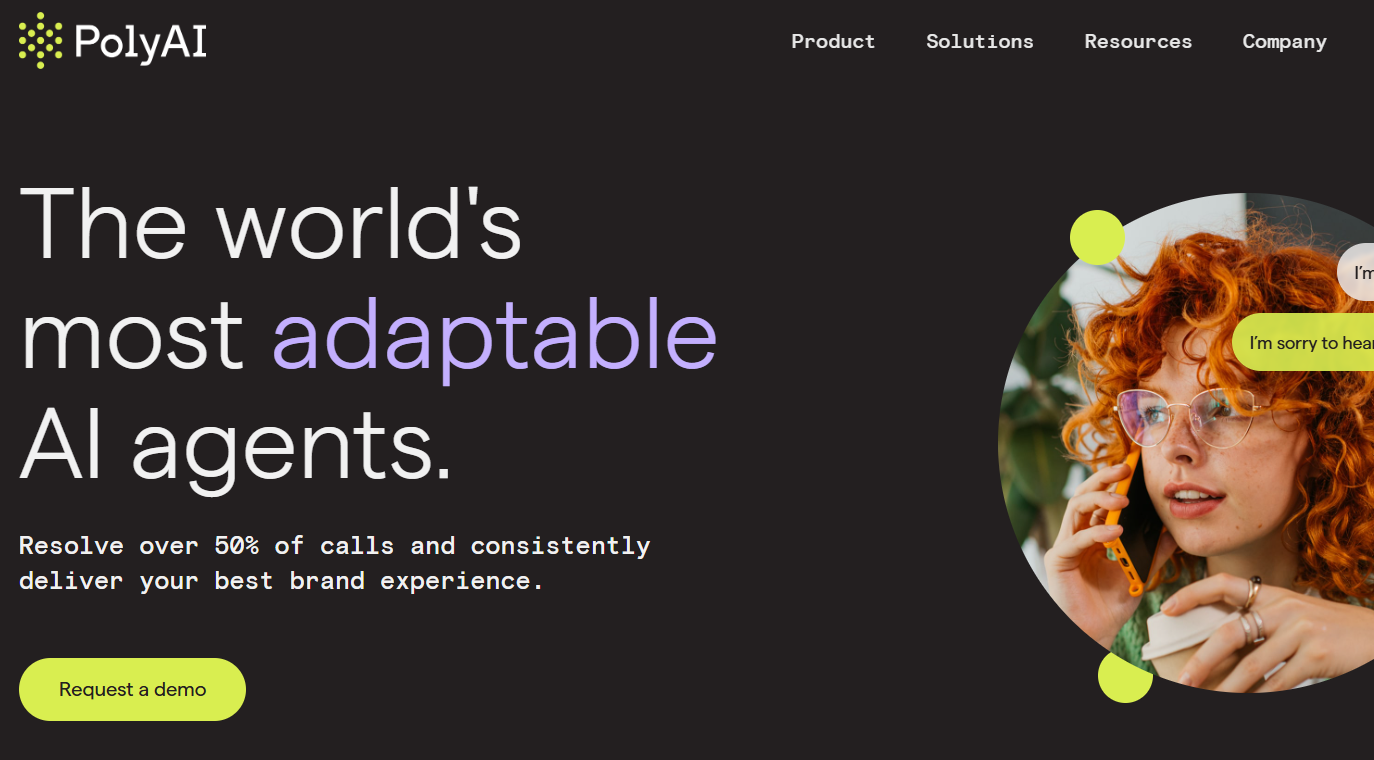
No one enjoys being stuck in long phone queues for customer service. Yet, with surging call center costs and many businesses pushing customers toward online chat or FAQs, the inability to even make a call can leave customers feeling abandoned and frustrated.
PolyAI is tackling this challenge head-on by deploying AI voice assistants that blend seamlessly into customer interactions. These assistants are so intuitive and competent that users often don't realize they're speaking to AI.
What Sets PolyAI Apart
What makes PolyAI stand out is its approach to conversational design. Unlike other systems that rely on limited, predefined response options and attempt to predict conversations, PolyAI's platform uses advanced machine learning to dynamically and authentically respond in real-time. This method enables its AI to adapt more naturally during interactions.
Note: the core of PolyAI's platform has been built on insights from over a billion real-world voice conversations, which allows it to handle diverse customer queries with impressive sophistication.
Value and Growth
Major UK-based companies such as Metro Bank, Greene King, Whitbread, and Starling Bank are already using PolyAI to manage their customer support calls efficiently. Following a successful $40 million Series B funding round, PolyAI is setting its sights on global expansion. With a diverse team representing 35 countries and nearly as many languages, the company is well-equipped to scale its operations. PolyAI's technology is not only capable of swiftly mastering new languages but also adapts its tone to match the unique voice of the brands it represents.
Technology
Mistral AI
Mistral stands as a shining example of rapid growth for AI startups, making it a top contender for partnerships with major tech players like Microsoft.
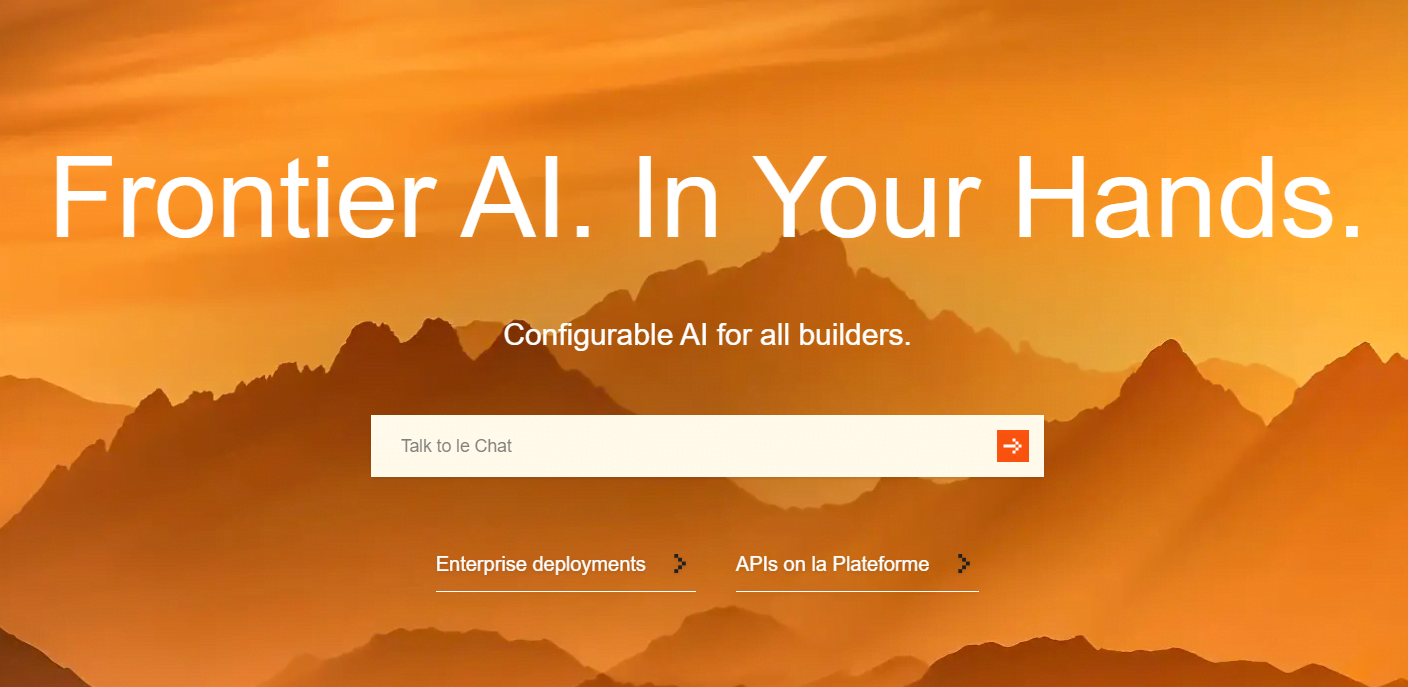
Founded in May 2023 by Arthur Mensch, Timothee Lacroix, and Guillaume Lample, distinguished alumni of Google DeepMind and Meta, Mistral quickly made headlines by raising an impressive $113 million seed round just four weeks after its inception. At that point, the French startup had neither a product nor customers, leading skeptics to question whether it was merely another indicator of an AI investment bubble. However, Mistral silenced critics by December 2023 with the launch of its flagship model, Mistral 8x7B. This open beta large language model (LLM) paved the way for an additional $415 million in funding during its Series A round.
Mistral claims that its 8x7B model outperforms Llama 2 70B on numerous benchmarks and exceeds GPT-3.5 on most standard performance evaluations. These advancements demonstrate the French startup's potential to disrupt the AI landscape.
What Sets Mistral AI Apart
Eager to diversify its AI portfolio, Microsoft selected Mistral as a strategic partner. This collaboration seeks to achieve three primary goals:
- Supercomputing Infrastructure. Microsoft will provide Mistral with access to its Azure AI supercomputing infrastructure. This will ensure Mistral benefits from world-class performance and scalability when training its future AI models.
- Market Expansion. Mistral's advanced models will be integrated into Microsoft's ecosystem, available to customers through the Models-as-a-Service (MaaS) offering in Azure AI.
- Research and Development. The partnership will extend to joint efforts in creating purpose-specific models for tailored use cases, such as workloads within the European public sector.
Value and Growth
This partnership exemplifies the mutual reliance between well-established tech giants and agile startups in the AI space.
Specialized startups like Mistral serve as engines of innovation, capable of rapidly developing groundbreaking technologies. On the other hand, tech giants like Microsoft bring unmatched resources, infrastructure, and market reach to scale these innovations globally.
While some observers interpret the collaboration between major corporations, like Microsoft, and startups, like Mistral, as an indication of an emerging AI oligopoly, the reality is more nuanced. To stay competitive, large tech companies need the ingenuity of startups to drive cutting-edge advancements, ensuring a dynamic and innovative AI ecosystem.
ElevenLabs
ElevenLabs specializes in advanced text-to-speech technology, delivering AI-generated voices that replicate human speech with remarkable precision.
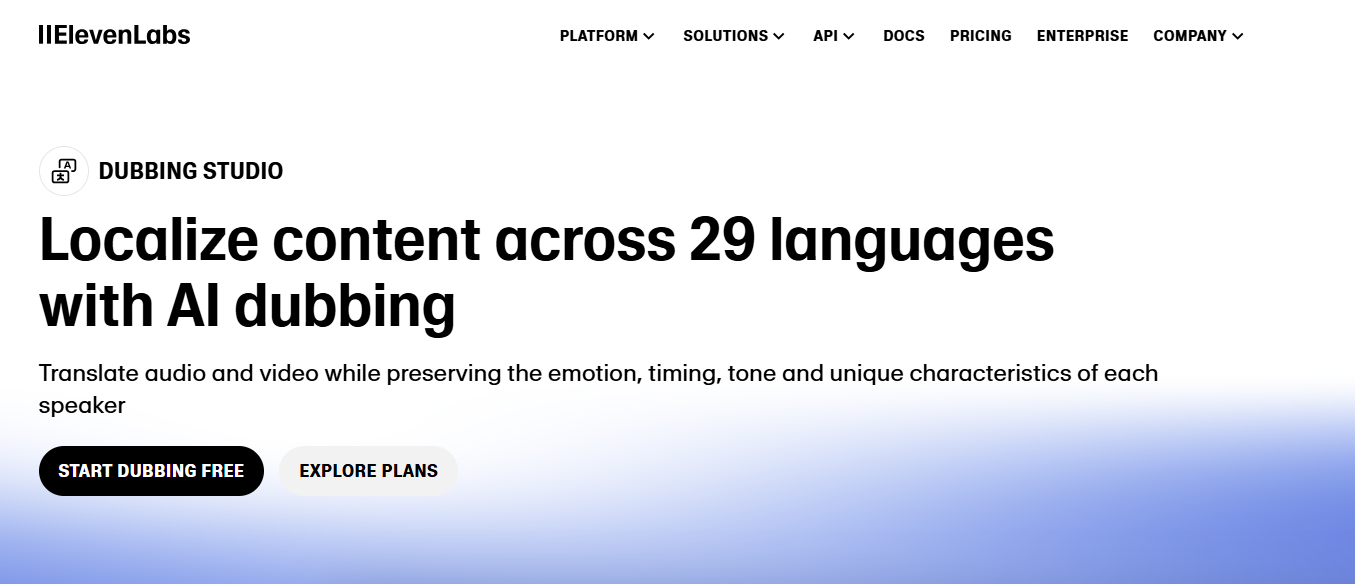
Founded in 2022, ElevenLabs has rapidly grown into a leading player in synthetic voice AI, standing out as one of the most promising startups in the UK. With headquarters in London and New York, this innovative company has achieved extraordinary success, rising from a modest $2 million seed round in early 2023 to a $500 million Series C funding round just two years later.
Supporting over 24 languages and offering APIs for developers, the company has positioned itself as a pioneer in redefining how AI voice tools are created and utilized. Backed by prominent investors such as Andreessen Horowitz and Sequoia, ElevenLabs has cemented its role as a key player in the rapidly evolving AI landscape.
What Sets ElevenLabs Apart
The company recently achieved unicorn status with a valuation exceeding $1 billion, following an $80 million Series B led by Andreessen Horowitz. This milestone comes less than two years after its launch, and ElevenLabs intends to utilize its new funding to expand its team and accelerate product development. Just months prior, during its Series A funding round, the company had been valued at $100 million, showcasing a meteoric rise in market success.
Value and Growth
Among the round's participants were former GitHub CEO Nat Friedman and Daniel Gross, a former AI lead at Apple, emphasizing the caliber of ElevenLabs' potential. Their involvement highlights the growing interest in London as a global hub for artificial intelligence development.
The recent developments around ElevenLabs reflect the broader trend of London's emergence as Europe's leader in AI innovation. High-profile moves, such as Google's $1 billion investment in a new data center, OpenAI's expansion into London with its first office outside the U.S., and C3.ai relocating its European headquarters to the city, have reaffirmed its status as a center for cutting-edge AI advancements. British AI entrepreneurs, such as the founders of DeepMind (now part of Google), have also built companies valued at billions, further bolstering the region's reputation as a global AI powerhouse.
Unify AI
Large language models (LLMs) are transforming industries at an unprecedented pace, and Unify AI is here to bridge the gap between developers and the most suitable models for their needs.
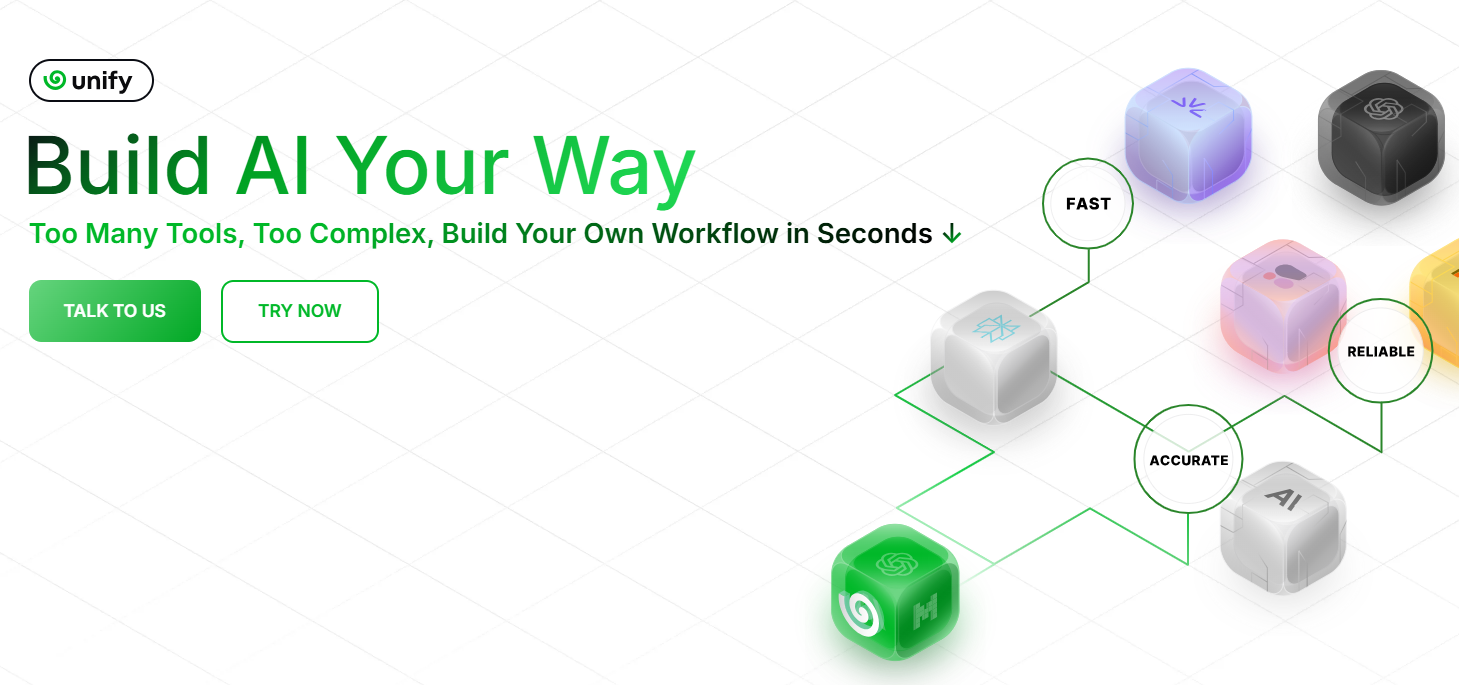
While LLMs are at the helm of the AI revolution, their occasional inaccuracies, often referred to as "hallucinations," pose significant challenges for businesses that depend on them for precision. Additionally, with an overwhelming number of LLM alternatives available, determining the ideal model for specific tasks is anything but straightforward. This is where Unify AI steps in.
Unify AI empowers businesses to unlock AI's potential by optimizing access to top-performing LLMs. By tailoring model selection to specific developer requirements, this London-based company enhances the reliability and efficiency of LLM pipelines. The system is designed to prioritize quality, cost-effectiveness, and speed. At its core lies a cutting-edge neural network router that independently identifies the models best suited for particular tasks.
What Sets Facia.ai Apart
Founder and CEO Daniel Lenton highlights Unify AI's competitive edge, built on three fundamental pillars: its innovative router, impartial business approach, and comprehensive strategy for LLM integration. This trifecta has set the company apart in an increasingly saturated market.
Value and Growth
Since its 2022 launch, Unify AI has made significant strides, securing over £6.3 million in seed funding. Backers include A. Capital, M12, Essence VC, and Y Combinator. Recent developments reveal that Unify AI is in discussions with several Fortune 500 companies and numerous startups that seek to optimize their LLM deployment strategies, further reflecting the company's rapid growth and expanding client base.
Construction
FYLD
FYLD is transforming construction safety and efficiency through its cutting-edge, AI-driven field management platform.
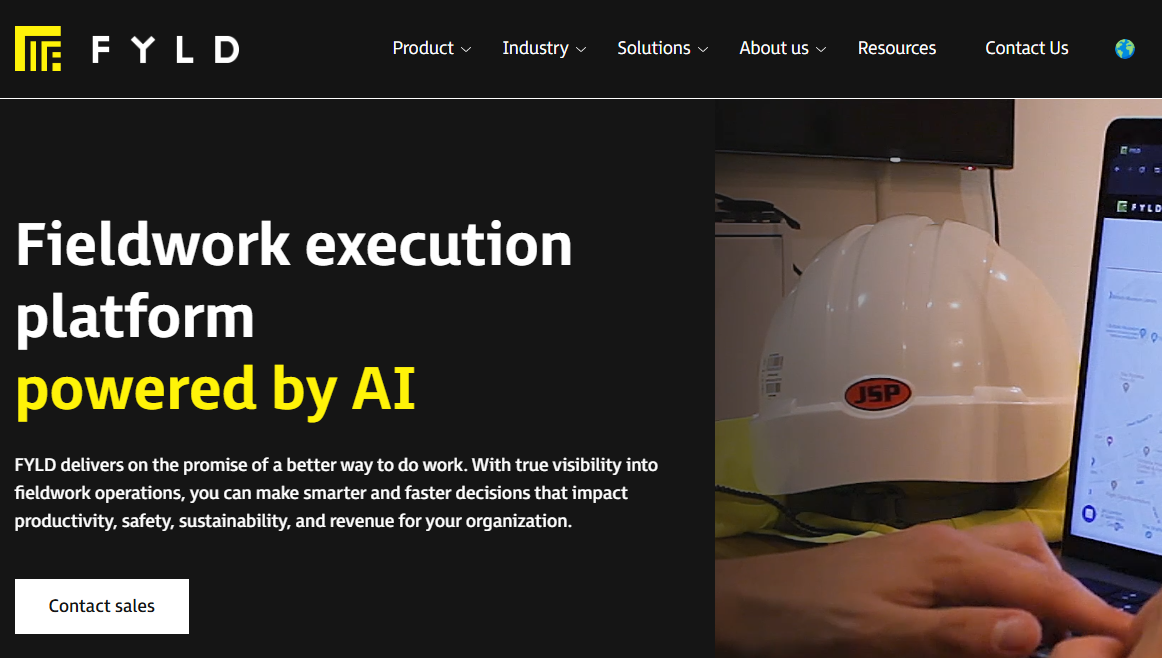
Supervising field teams has always been a challenge, but it has only intensified with the rise of hybrid and remote work. Today, 54% of project managers in the construction industry work entirely from home, a sharp increase from just 16% in 2021. This shift has introduced unique challenges, particularly in terms of health and safety in infrastructure. Limited on-site visibility can lead to safety oversights, communication breakdowns, and decision-making delays, often derailing project timelines and inflating budgets.
To address these issues, FYLD has risen as a game-changing, AI-powered field management solution. Ranking at #20 in last year's Index, the platform leverages advanced image recognition technology to conduct real-time video risk assessments (VRAs), ensuring seamless safety and efficiency during site transitions.
What Sets FYLD Apart
The impact of FYLD's platform rests on three key pillars that benefit the industry:
- Enhanced Safety. FYLD's integration of VRAs has driven a remarkable 20% decrease in incidents and injuries, ensuring safer conditions for site teams. Throughout 2024 alone, FYLD conducted an average of 1,522 safety assessments daily.
- Improved Productivity. By eliminating the need for managers to be present on-site, FYLD has unlocked an 8% boost in field team output. Managers can also strategically analyze site footage and prioritize visits, leading to better resource optimization.
- Better Collaboration. Traditional management systems, often reliant on paper-based processes, tend to silo critical information. This inefficient system results in delays, budget overruns, and missed opportunities to address risks. FYLD's digitized approach bridges these gaps, driving a culture of collaboration and smarter decision-making in real-time.
Value and Growth
FYLD's successes haven't gone unnoticed. The startup secured £7 million in funding from NatWest in October, with plans for a Series B round this year. This funding will accelerate its expansion into the U.S., where a robust construction workforce of 10 million promises significant market opportunities.
The construction sector has long struggled with outdated operational processes, but FYLD has proven itself capable of catalyzing meaningful change. By replacing archaic paper trails with digital solutions, FYLD has empowered major clients like Kier, Southern Water, and Balfour Beatty to adopt modernized and efficient operations. The platform has ensured that the rise of remote work doesn't hinder the productivity of field teams.
Healthcare
Cogs AI
Cogs AI is a groundbreaking mental health application created by neurodivergent individuals, for neurodivergent individuals.

The app, co-founded by Zareen Ali and Felix de Grey in 2021, specifically addresses the unique needs of the neurodivergent community. Neurodivergent people are twice as likely to experience poor mental health compared to their neurotypical counterparts. According to Zareen Ali, this disparity stems from the fact that mainstream mental health therapies have traditionally been developed with neurotypical brain function in mind. Consequently, these therapies often fail to adequately support individuals with conditions such as Autism Spectrum Disorder (ASD), ADHD, Dyslexia, Dyscalculia, ADD, and Dyspraxia.
Cogs AI has been meticulously crafted to fill this gap. It offers neurodivergent users practical tools to help cultivate sustainable self-care routines and manage overwhelming emotions effectively.
What Sets Cogs AI Apart
The innovation behind Cogs AI stems from a deep understanding of its users. Recognizing that emotional well-being for neurodivergent individuals is closely tied to sensory experiences, the app is designed to address both mental and physical aspects of health. This user-centered approach is rooted in the lived experience of Zareen Ali, who is autistic. Ali's insights, combined with her advanced studies in Educational Neuroscience and Developmental Psychology, as well as her hands-on professional experience working with neurodivergent children, highlighted a critical gap in mental health support tailored for this community.
Value and Growth
Cogs AI has secured £650k in early-stage funding, supported by notable investors such as Bethnal Green Ventures, The Francis Crick Institute, and Innovate UK. This advancement builds on its successes, including the renewal of its NHS contract—a milestone achieved due to a compelling impact evaluation. The evaluation revealed that the Cogs AI app was four times more widely adopted compared to the NHS's alternative offering. This is unsurprising, given that users of the Cogs app reported a 30% improvement in mental health outcomes within just two weeks.
Currently integrated into NHS services, Cogs AI has demonstrated its ability to alleviate symptoms of anxiety and depression among neurodivergent individuals, with reports of a 32% improvement. By offering immediate support that doesn't depend on human interaction, the app ensures users can access help exactly when they need it.
Walking on Earth (WONE)
By delivering real-time stress management with its AI-driven coaching platform, WONE is addressing workplace stress before it escalates into chronic conditions.

Reeva Misra founded WONE in 2020, amid pandemic anxiety. She speaks openly about her inspiration to start this venture. “We've normalized a culture in which the majority of workers face dangerously high levels of workplace stress," Misra says.
A 2023 study conducted by WONE revealed that 38% of employees endure daily chronic stress. The consequences are severe, leading to burnout and long-term health issues. This not only affects individuals but also imposes significant financial burdens on employers and the economy. Work-related stress reportedly costs the UK economy £28 billion annually due to absenteeism.
What Sets WONE Apart
At its core, WONE is an AI-powered stress management solution. But its uniqueness lies in being stress-preventing, while most solutions on the market focus on post-stress therapy. Offered as a mobile app, WONE helps employees alleviate stress through brief, restorative activities during their workday. The platform is designed for employers to support teams vulnerable to silent burnout by providing proactive, real-time interventions to enhance workplace wellbeing.
Value and Growth
Bolstered by £7.6 million in angel and private equity investments, and guided by experienced advisors such as Arianna Huffington, Misra is keen to scale WONE's impact over the next five years. She aims to leverage the platform's comprehensive data to advance research on the connection between stress and chronic illness. Her vision is to extend WONE's utility beyond corporate clients, making it a go-to resource for stress management in schools, healthcare providers, businesses, and the public sector.
Novai
Novai’s cutting-edge DARC technology is ushering in a new era of early detection for eye diseases like glaucoma and Age-related Macular Degeneration (AMD). This groundbreaking method enables timely intervention, helping to preserve vision before irreversible damage occurs.
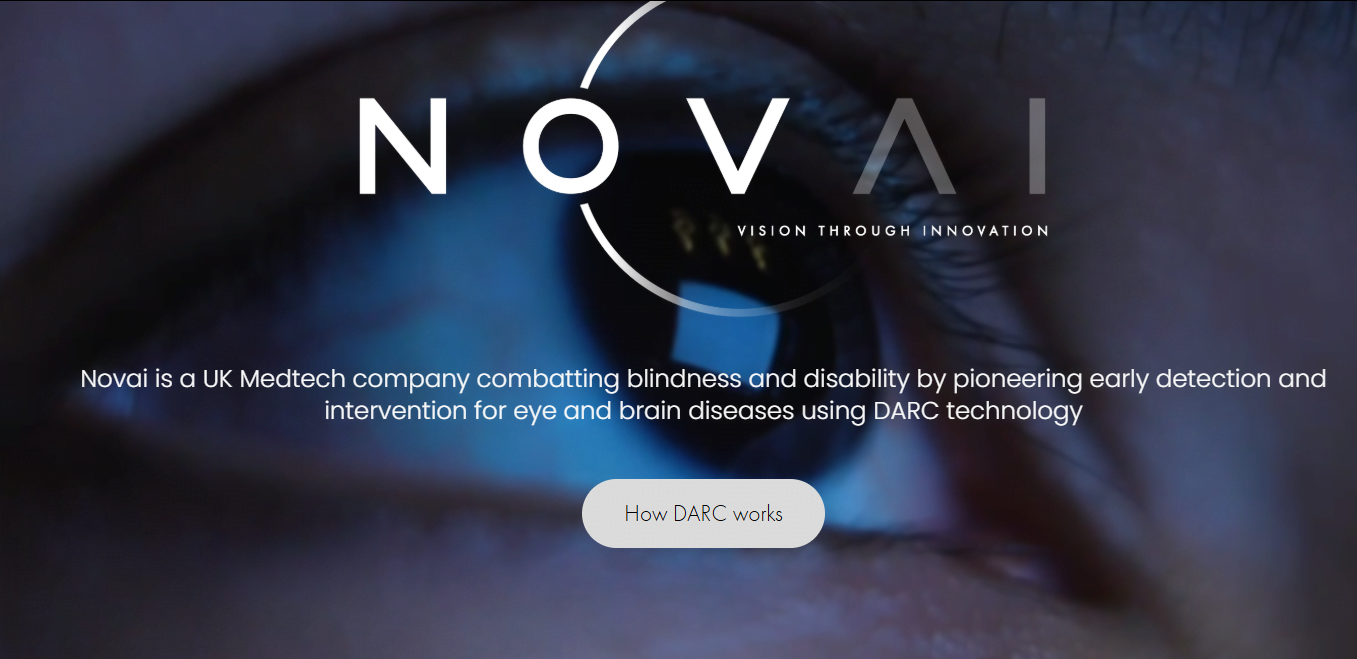
With an aging population, vision loss is rapidly becoming a critical public health issue. For instance, the number of individuals living with glaucoma in the UK is predicted to rise by nearly 30% between 2020 and 2035. While treatments are available to slow disease progression, late diagnoses often result in permanent vision impairment due to the limitations of current diagnostic tools.
What Sets Novai Apart
Novai tackles this challenge head-on with its innovative DARC (Detection of Apoptosing Retinal Cells) technology. Unlike traditional methods such as optical coherence tomography (OCT), DARC identifies early cellular stress associated with AMD and other diseases well ahead of typical diagnostic timelines. Developed by a team of researchers at University College London, this advanced technique uses specialized imaging to detect retinal cell apoptosis at a much earlier stage.
Here's how it works: a fluorescent biomarker is administered to the patient via an intravenous injection. This is followed by retinal imaging, using equipment already present in many hospitals, making the process practical and scalable. An AI-driven algorithm then processes the images, measuring and mapping the quantity and distribution of apoptotic retinal cells. The result? A comprehensive report that provides clinicians with invaluable insights into the patient's condition.
Value and Growth
Novai secured an initial £500,000 seed investment in 2020 and embarked on a series of 25 pre-clinical studies, followed by numerous clinical trials. The results exceeded expectations, demonstrating DARC's ability to predict disease progression up to three years in advance of OCT methods.
These achievements have cemented Novai's reputation in the field, leading to significant partnerships with renowned pharmaceutical and biotech companies. Now, Novai is entering a pivotal Phase IIb trial to secure regulatory approvals in the US and Europe.
Science and Industry
Mach42
Mach42 is on a mission to revolutionize the product design development process by leveraging AI to halve its duration.
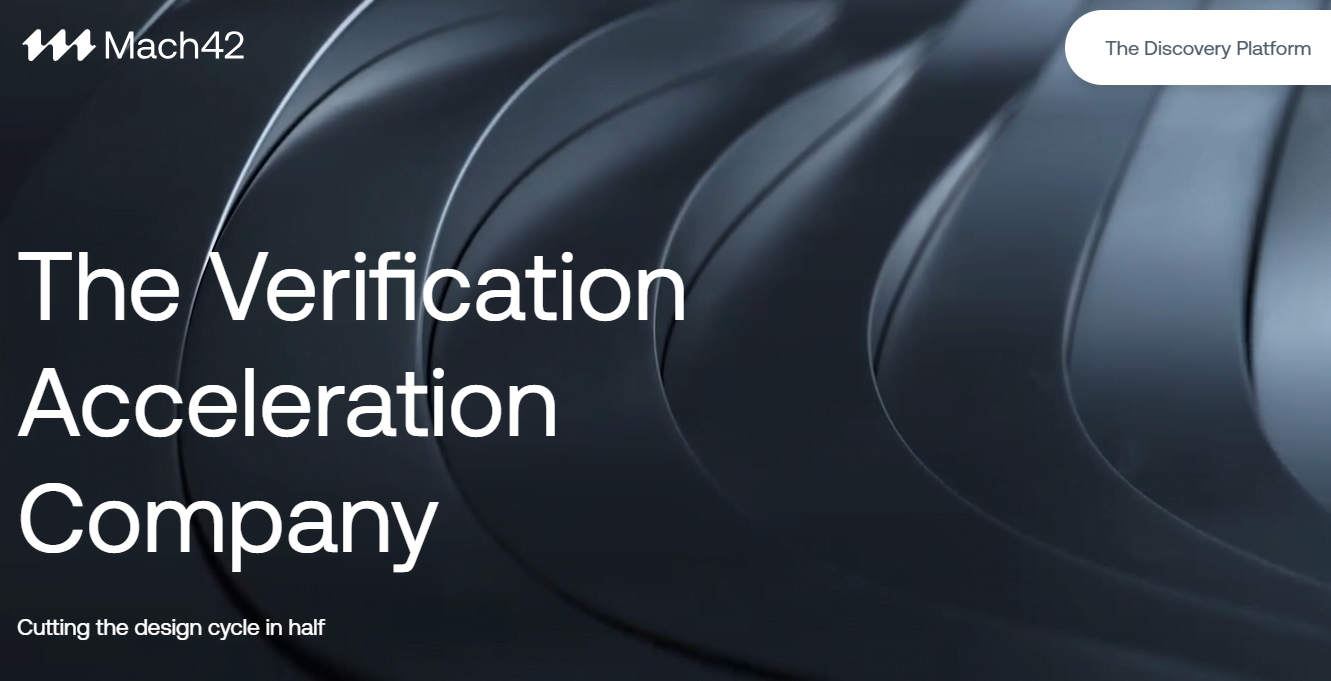
For scientists, lengthy numerical simulations are crucial yet notoriously time-consuming, often taking months to process, and require manual input of complex file formats, as well as access to supercomputers. Identifying this bottleneck, Mach42 was founded in 2019 (originally known as Machine Discovery) to accelerate the verification challenges faced by sectors that rely on such simulations. The company underwent a rebrand to become Mach42 last year, marking its evolution into a cutting-edge solutions provider.
The concept for Mach42 emerged at the University of Oxford, where the founding team recognized a critical need for accessible tools to support intricate computational workflows. The result was a spinout company designed to meet this demand. Employing AI, advanced simulation technology, and cloud computing, the enterprise offers instantaneous results, with its core focus on semiconductor design and fusion markets.
What Sets March42 Apart
At the heart of their innovation is the proprietary 'Discovery Platform,' software that enables engineers to efficiently explore entire design spaces in significantly less time than conventional methods. According to the founders, the software integrates seamlessly into commercial analog design workflows, offering ease of use and compatibility with the industry.
The focus on semiconductors couldn't be more timely, especially in an era where they form the backbone of all things technological. Accelerating the time to market for these essential components holds immense potential—not just for manufacturers, but for industries worldwide. Reducing design cycles means an uptick in innovation and faster access to groundbreaking technologies for everyone.
Value and Growth
However, like many disruptive startups, Mach42 faced early challenges in securing commercial collaborations. Co-founder Kasim explains, "Earning the trust of commercial customers was one of the major hurdles we had to overcome." The company attributes its success in breaking through this barrier to its highly credible team and strong relationships with early partners.
Mach42 takes pride in the availability of its solution for production-level use, a testament to the team's relentless commitment to innovation. Backed by renowned investors such as BGF, Foresight, Future Planet Capital, Oxford Technology, and Williams, the company is well-positioned to continue making waves in the industry.
Cybersecurity
Mindgard
Mindgard equips businesses with the essential AI security tools needed to safeguard against the risks they should never encounter.
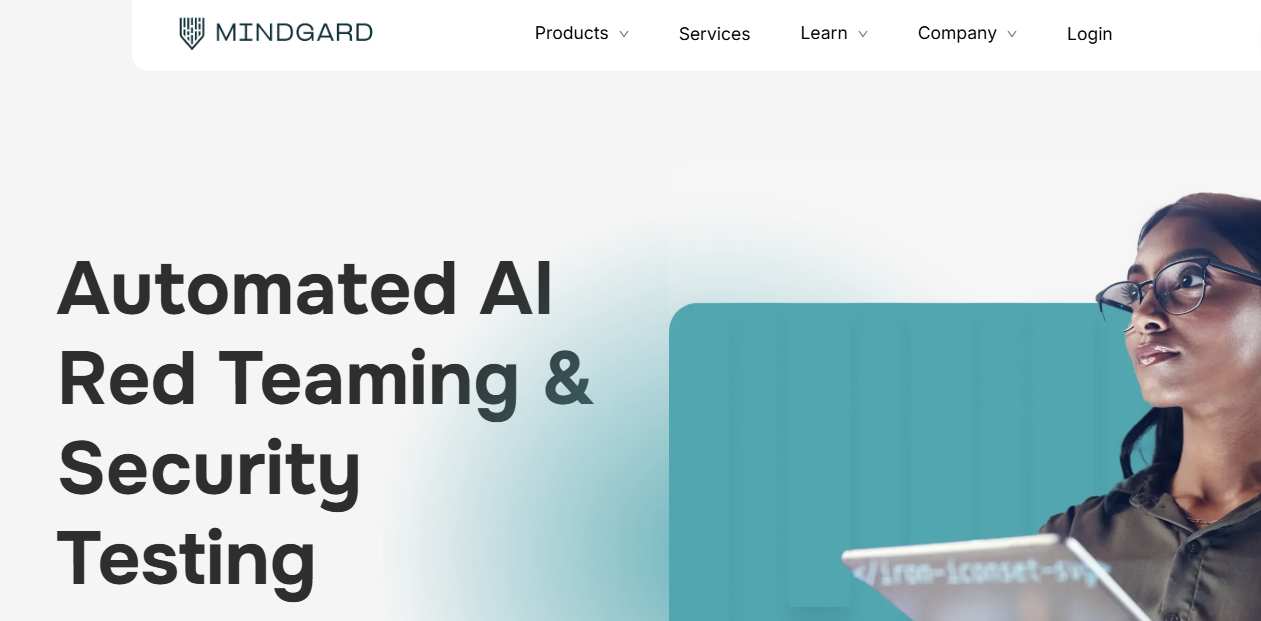
While AI has revolutionized industries by opening up countless opportunities, it has also introduced new avenues for cybercriminals to exploit. Anticipating these challenges, Peter Garraghan, cofounder of Mindgard, foresaw the potential security gaps as early as 2016. During his research into AI and machine learning vulnerabilities, he realized that incorporating AI into software systems would inevitably attract sophisticated cyber threats from all directions.
To address this, Mindgard offers a comprehensive AI security solution. Its suite includes automated penetration testing, threat detection and response, and Data Loss Prevention (DLP), enabling businesses to implement AI systems with confidence and safety. The platform seamlessly integrates security measures throughout the Software Development Life Cycle (SDLC), from initial design stages to final production. “It’s critical to identify and remediate vulnerabilities within AI models and their interactions with surrounding systems," says Garraghan. "This emerging AI component demands specialized tools and focus."
What Sets Mindgard Apart
Mindgard's platform is tailored to handle all types of neural networks, including generative and predictive AI across image, audio, and multi-modal applications. This wide-ranging capability ensures that security is embedded at the earliest stages of the software development life cycle (SDLC), providing robust protection for diverse machine learning use cases.
Value and Growth
The company achieved significant milestones in recent years. It closed a £3 million seed funding round in September 2023 and is poised to secure additional investment shortly. Recognized for its innovation, Mindgard was named the UK's Most Innovative Cyber SME at the 2023 Infosecurity Europe conference.
Facia.ai
Facia.ai provides a cutting-edge solution in the battle against deepfake technology, ensuring the security and authenticity of digital identities.
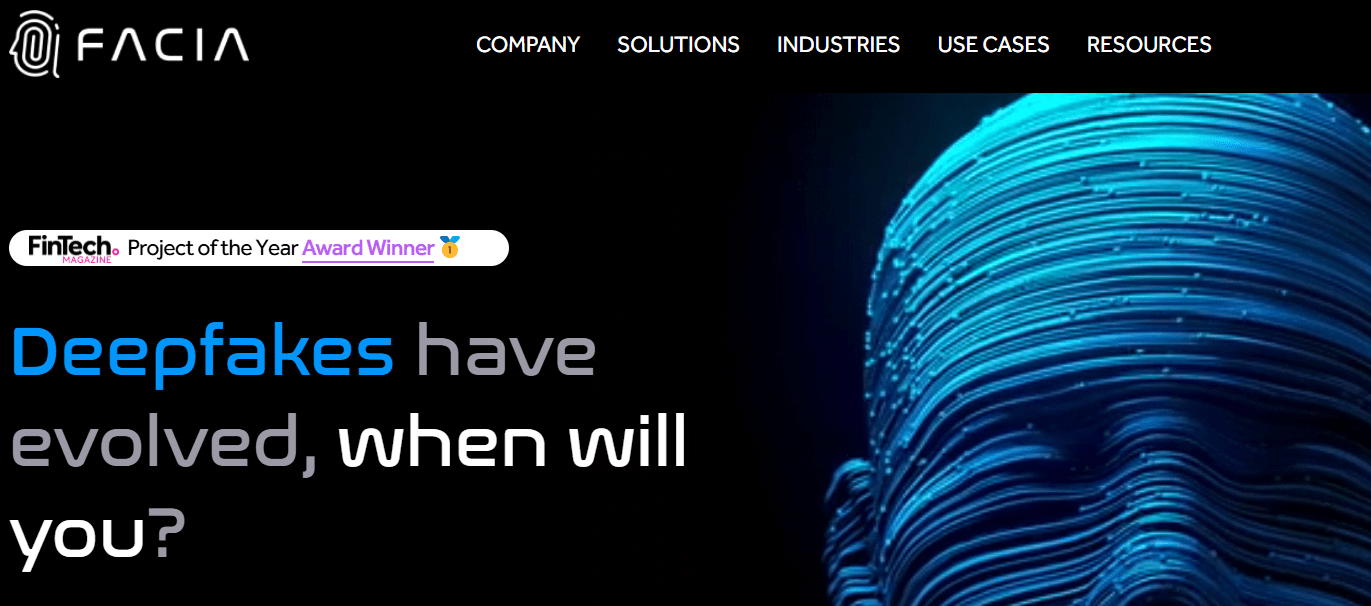
Beyond their intrigue, deepfakes pose serious threats to online safety and integrity. From a staggering 654% increase in cryptocurrency scams to the misuse of people's images for fraudulent product promotions, identity fraud via deepfakes is growing at an alarming rate.
Facia.ai has a clear mission: to combat identity theft. This is achieved through its state-of-the-art biometric authenticator, an AI-powered tool that can verify identities with unmatched accuracy in just seconds.
What Sets Facia.ai Apart
The roots of this mission are deeply personal. Facia.ai co-founder and CEO Mujadad Naeem recounted a chilling incident with a family member who, while using a ride-hailing service, found themselves calling a driver who wasn't the person behind the wheel. Thankfully, the situation ended safely, but it underscored the very real dangers of identity fraud and the urgent need for better solutions.
Remarkably, the company positions itself as the only global solution capable of effectively detecting deepfakes and other spoofing attempts, boasting 100% accuracy in real-world conditions.
Value and Growth
Buoyed by a substantial £930,000 investment led by angel investor Programmers Force, the future looks bright for Facia.ai. With its human-centric approach and pioneering technology, it is well-positioned to continue leading the fight against cyber threats.
Workforce Management
Sona
Sona, an intelligent AI-powered platform, redefines workforce management for industries such as healthcare and hospitality by enhancing efficiency and significantly reducing operational costs.
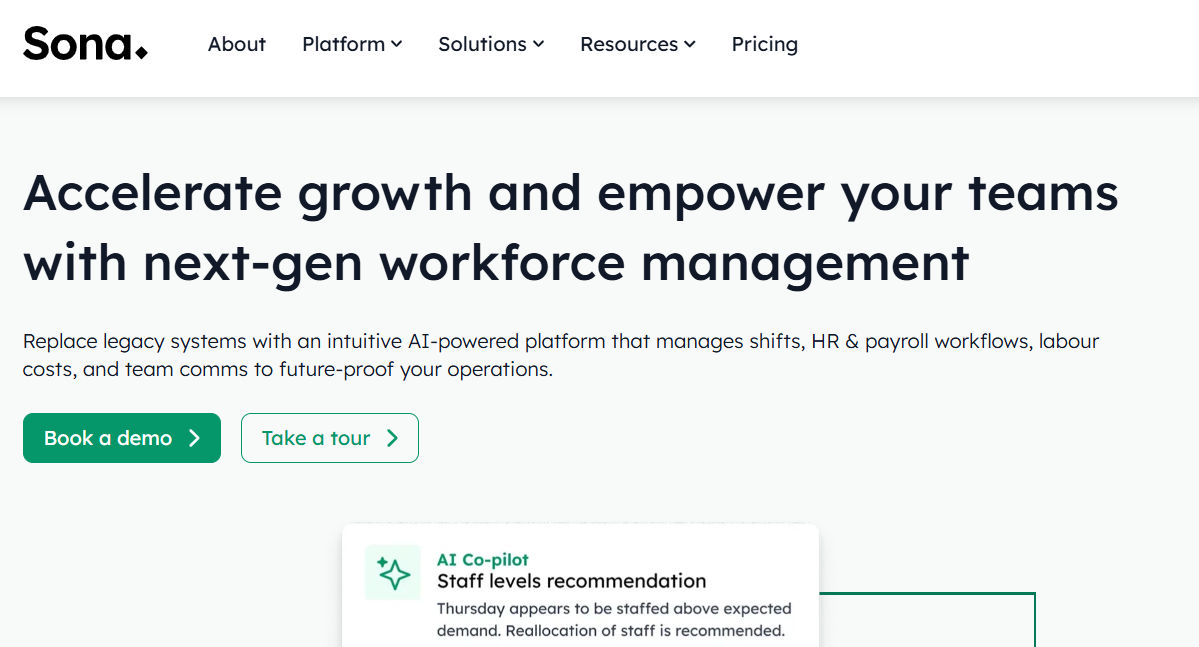
For business owners, managing a workforce often feels like navigating chaos. Tasks like organizing leave, processing payroll, and handling timesheets can be tough for small businesses. Now imagine overseeing operations for a nationwide chain of 3,000 cafés or managing the schedules of 20,000 healthcare agency employees. These are situations rife with logistical headaches.
That's where Sona steps in, offering a transformational solution for large-scale enterprises. With AI at its core, Sona automates workforce processes, eliminating the need for paper and outdated spreadsheets. This innovative approach aims to address pain points prevalent across industries like manufacturing, sanitation, construction, and aviation. However, Sona has wisely chosen to keep its focus narrow for now, concentrating its expertise on hospitality and care, two industries its founders know inside and out.
What Sets Sona Apart
Among its key offerings, the Sona Shift Filler stands out. This tool serves as an internal marketplace where staff can pick up extra shifts without managers having to call on costly agency staff. To put that into perspective, the NHS has been known to spend up to £2,500 per shift for last-minute nurse coverage. Tools like these are game changers, particularly in sectors like hospitality and healthcare, which are grappling with worker shortages, inflationary pressures, and shrinking profit margins. Sona enables businesses to optimize labor deployment intelligently, leading directly to increased profitability.
Value and Growth
Last May, Sona secured $21.1 million in Series A funding, solidifying its reputation as an innovative player in the workforce management space. Its client roster already includes prominent brands like Paul UK. But the platform's ambitions don't stop there. Sona aims to empower the world's 2.7 billion frontline workers, an audacious goal that feels entirely within reach given its innovative approach and proven track record.
Real Estate / Solar Energy
Metris
Metris is an end-to-end solar platform for real estate, revolutionising the adoption of solar energy through its AI-powered platform.

The decarbonization of commercial buildings presents a critical challenge in mitigating the climate crisis. These properties account for 30% of carbon emissions, yet despite declining costs and improved accessibility of on-site solar solutions, adoption remains alarmingly low at just 5%. Metris Energy seeks to address this gap by transforming buildings into independent energy producers while empowering property owners to contribute to sustainable energy production.
What Sets Metris Apart
Metris Energy utilizes artificial intelligence to optimize the solar adoption process. Its platform, MetrisOS, provides seamless functionality to all key stakeholders, including solar installers, property owners, and energy funds. By simply entering a building's address, users can instantly generate feasibility studies that showcase the property's solar potential and estimated energy savings over its lifecycle.
Additionally, MetrisOS streamlines the complexities of the Purchase Price Allocation (PPA) process. From credit assessments to pricing calculations and asset forecast management, the platform centralizes these functions, allowing users to monitor operations in real-time. Its advanced features also predict and preempt potential on-site issues, ensuring ongoing system efficiency.
Value and Growth
Launched in 2023, Metris Energy has swiftly captured attention within the energy sector. With £2 million in funding secured from Octopus Ventures and Aenu VC, as well as recognition for its innovative approach, the company won the "Most Ambitious" solution award at the Kraken x Tech Zero hackathon in July 2024. This recognition is cementing its position as a driving force in sustainable energy innovation.
Sources used in this research:

Roman Zomko
Other articles